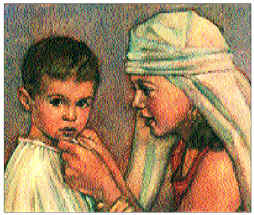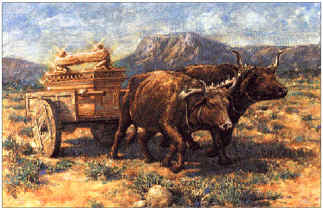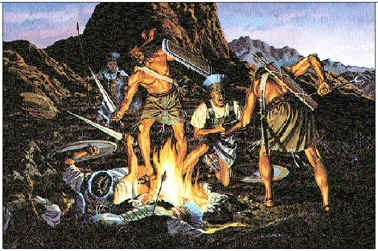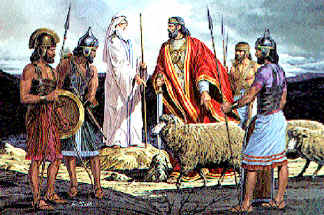The Bible: Samuel and Saul
Birth of Samuel: 1 Samuel 1:1-2:11
The book of 1 Samuel begins at a time when the judges still ruled Israel. Samuel was Israel’s last judge and the first priest and prophet to serve during the time of a king. Samuel’s mother was Hannah, a godly woman who had long prayed for a son. Each year she went with her husband, Elkanah, to Shiloh to worship and sacrifice to God (1 Samuel 1:3-5). Shiloh, about 20 miles north of Jerusalem, was the center of religious worship in Israel’s early history (see Joshua 18:1 and Judges 21:19).
Unfortunately, Hannah was unable to have children. Childlessness was a social stigma in ancient Israel, and Hannah became despondent, especially when Peninnah taunted her (1 Samuel 1:6-7). Hannah pleaded with God to give her a son, promising to give him back to God, possibly as a Nazirite (compare verse 11 with Numbers 6 and Judges 13:3-5). God eventually answered Hannah’s prayer and she conceived (verse 20).
 |
| “The Lord remembered her…. So in the course of time Hannah conceived and gave birth to a son. She named him Samuel, saying, ‘Because I asked the Lord for him'” (1 Samuel 1:19-20). |
In a prayer of thanksgiving (1 Samuel 2:1-10), Hannah praised God for giving her a son. Centuries later, Mary, the mother of Jesus, would model her own song of praise — called the Magnificat — after Hannah’s prayer (Luke 1:46-55). Elkanah and Hannah returned home to Ramah (1 Samuel 2:11), but Samuel remained at Shiloh to assist Eli in the Lord’s sanctuary. The fact that Samuel wore a linen ephod — a garment worn only by priests — shows that he was a priest in training (verse 18).
The sins of Eli’s sons: 1 Samuel 2:12-26
In this passage, Samuel’s faithfulness and rapid rise into God’s favor contrast sharply with the wickedness and ultimate demise of Eli’s two sons. Although Hophni and Phinehas were priests, they treated God’s offerings with contempt. Verses 12-17 describe their scandalous behavior. Not only did they take the sacrifices before they were offered to God, but they also ate the meat before the fat was burned. This was against God’s law (Leviticus 3:3-5). As if this were not enough, they also sexually violated the women who served as temple aides (1 Samuel 2:22).
Eli knew about his sons’ wicked behavior, and even confronted them (verses 22-23), but he did not remove them from their duties. Finally, God’s patience reached a breaking point and the entire priestly line of Eli faced divine judgment. A man of God brought a tragic message. Eli’s priestly reign was about to end, and his sons would die on the same day (verses 27-36). Eli’s successor is not identified here. But for now, Samuel was the religious leader of Israel. Later, King David appointed as priests Zadok and Ahimelech (2 Samuel 8:17), whose families seem to have had roots going back to the sanctuary at Shiloh and beyond that to Aaron (1 Chronicles 6:3-8; 24:1-3).
 |
| “So Samuel went and lay down in his place. The Lord came and stood there, calling as at the other times, ‘Samuel! Samuel!’ Then Samuel said, ‘Speak, for your servant is listening'” (1 Samuel 3:9-10). Illustration by Dan Andreason |
God calls Samuel: 1 Samuel 3
Samuel received a dramatic revelation in which God repeated his judgment against the house of Eli (verses 1-18).
The old era of the “judges” has ended, and a new age of divine communication with humankind has broken forth — the age of the prophet…. The section concludes with a statement about Samuel’s increasing importance as a religious leader in early Israel (verses 19-21). His fame as a spokesman for God now extends to the limits of Israel. His priestly upbringing, now strengthened by God’s call, prepares Samuel for his historic leadership of God’s people. His stature as the spiritual leader of his people must now extend to the political realm, where he must answer the rising demand for a king. Thus there is little doubt within the Old Testament about Samuel’s importance. He guides Israel from the time of the judges to the time of the monarchy. (Frank Johnson, 1 and 2 Samuel, Genesis to Revelation Series, book 5, pp. 8-9)
The Ark is captured: 1 Samuel 4
The Philistines defeated Israel at Ebenezer (verses 1-2). The Israelites recognized that God had caused their defeat, but they did not know why. They sent men to Shiloh, who brought back the ark of the covenant. They believed that if the ark was with them in battle, it would save them from their enemies (verse 3).
They were sadly mistaken. The Philistines slaughtered the Israelites in battle and captured the ark, killing Eli’s sons, Hophni and Phinehas, in the process (verse 11). About 400 years later, the prophet Jeremiah would remind the people in Jerusalem of this event, telling them that God punished the Israelites for their wickedness (Jeremiah 7:12-15). Jeremiah warned that the presence of God’s temple in Jerusalem no more guaranteed safety than the ark at Shiloh had.
One Benjamite, when he saw the ark captured, ran from the battle toward Shiloh and told the news to Eli: “Israel fled before the Philistines, and the army has suffered heavy losses. Also your two sons, Hophni and Phinehas, are dead, and the ark of God has been captured” (1 Samuel 4:17).
This format of message — with each line bearing worse news than the last — occurs again in 2 Samuel 1:3-4. The mention of the ark was too much for Eli. He fell backward from his chair and broke his neck. God’s prophecy to Samuel had been fulfilled (1 Samuel 3:11-14).
The return of the Ark: 1 Samuel 5-6
The Philistines thought that by capturing the ark they had made the God of Israel subservient to their gods. They placed the ark in the temple of Dagon in Ashdod. When they awoke the next morning, they found their god Dagon fallen on the floor before the ark. They put Dagon back in his place, but the next morning they found him fallen again before the ark, this time with his head and hands broken off. Although Israel’s defeat was God’s punishment of Eli and his sons, and of the people for their general wickedness, it also served another purpose — God used the capture of the ark to demonstrate his supremacy in the land of the Philistines.
 |
| “They took two such cows and hitched them to the cart and penned up their calves. They placed the ark of the Lord on the cart. Then the cows went straight up toward Beth Shemesh, keeping on the road and lowing all the way; they did not turn to the right or to the left. The rulers of the Philistines followed them” (1 Samuel 6:10-12). |
God brought diseases upon the people of Ashdod, so they moved the ark to Gath, but the same thing happened there. The Philistines eventually decided to hitch two cows to a cart on which they placed the ark, and let the cows take it wherever they would. The cows went straight to the Israelite territory of Beth Shemesh, proving beyond doubt to the Philistines that God had inflicted the diseases upon them (1 Samuel 6:7-12).
Many of the men of Beth Shemesh showed disrespect for the ark of God, even looking inside it. God struck these men down. The ark was then taken to Kiriath Jearim to the house of Abinadab (1 Samuel 7:1).
Victory over the Philistines: 1 Samuel 7
The ark remained at Kiriath Jearim for 20 years. Under Samuel’s leadership, the Israelites “put away their Baals and Ashtoreths, and served the Lord only” (verse 4). This was a high point during the period of the judges.
Samuel gathered the people together at Mizpah for a day of fasting and rededication to God. When the Philistines heard about this, they decided to attack them. Samuel prayed to God on behalf of Israel, and God threw the Philistines into such disarray that they were routed by the Israelites (verses 7-11). Samuel continued as judge, and Israel subdued the Philistines.
Israel demands a king: 1 Samuel 8
When Samuel grew older, he appointed his sons as judges, but they became corrupt. The people of Israel took this occasion to demand a king so they could be like all the other nations. They were not satisfied with being God’s chosen people. Samuel was offended at their demand, but when he prayed to God, God told him: “It is not you they have rejected, but they have rejected me as their king. As they have done from the day I brought them up out of Egypt until this day, forsaking me and serving other gods” (verses 7-8).
In the light of the previous chapter, where Israel prospered under God’s chosen prophet and judge, the Israelites “could perpetrate no greater breach of trust, no more arbitrary exercise of self-will, no more senseless deed of vanity than to demand for themselves a human king” (P. Kyle McCarter, Jr., 1 Samuel, The Anchor Bible, vol. 8, p. 151). Under God’s instructions, Samuel warned the people what would happen to them if they had a king, yet they demanded one anyway. So God told Samuel to yield to their demands.
Israel’s first king: 1 Samuel 9-10
The book now digresses to tell the story of a tall, young Benjamite named Saul, who was searching with a servant for his father’s lost donkeys. They reached a town where a respected seer (prophet) happened to be. The servant suggested they ask the seer if he knew where the donkeys were, but Saul had no offering to give the seer. Fortunately, the servant had a quarter shekel of silver, and so they approached the seer.
The seer was Samuel. God had told Samuel that a young Benjamite would approach him, and that Samuel was to anoint him king. God had been overseeing all the previous, seemingly insignificant events.
Samuel showed special favor to Saul, of which Saul considered himself unworthy. Samuel anointed Saul king and told him what was to happen in the near future (1 Samuel 10:1-7). Then he told Saul: “Go down ahead of me to Gilgal. I will surely come down to you to sacrifice burnt offerings and fellowship offerings, but you must wait seven days until I come to you and tell you what you are to do” (verse 8).
Saul returned home, having seen all that Samuel prophesied fulfilled along the way. But Saul kept silent about being anointed king.
Samuel summoned the Israelites together in order to formally choose a king. His summons (verses 17-19) was in the form of a prophetic judgment speech, almost suggesting that the gift of a king would be punishment enough for Israel’s rejection of God. Samuel then commanded the people, “Present yourselves before the Lord by your tribes and clans” (1 Samuel 10:19). First, the tribe of Benjamin was chosen. Then, the clan of Matri was chosen among the Benjamites. Finally, Saul, son of Kish, was chosen to be king. The same progressive method of selection had been used to discover Achan as the one who had taken forbidden booty from Jericho (Joshua 7).
Saul was chosen king, but he was nowhere to be seen. Eventually, he was found hiding among the baggage, fearing to fulfill his God-appointed commission. When they discovered him, the people found that he was a head taller than anyone among them, and immediately hailed him king. Some troublemakers despised Saul openly, but Saul did not stop them.
Saul’s first action: 1 Samuel 11
Saul went back home and was plowing behind a team of oxen one day when messengers from Jabesh Gilead told him their town was besieged by the Ammonites. Then the Spirit of God came upon Saul, spurring him to unusually confident action. He commanded all the Israelites to rally behind him, and they thoroughly routed the Ammonites. Then everyone reaffirmed Saul as king (verses 14-15).
This episode is similar to many of the episodes in Judges, but with two important differences: All of Israel is involved, and Saul is publicly reaffirmed as king, not judge.
Samuel’s farewell: 1 Samuel 12
Samuel got the people to acknowledge his fairness as a judge (verses 1-5). Then he recounted God’s numerous interventions on behalf of his people (verses 6-11), and of their own ingratitude by demanding a king (verses 12-19). Samuel also assured the people that despite all this, God had not rejected them, and that he, Samuel, would continue to pray for them and instruct them in the right way (verses 20-23). Samuel concluded his address with a warning to serve God wholeheartedly (verses 24-25).
Like Joshua, Samuel led the whole nation in seeking after God (compare Joshua 24:31 with 1 Samuel 7:2-4). Samuel’s speech has many similarities with Joshua’s farewell address at Shechem (Joshua 24). Samuel’s exit as leader marked the end of an era. The time of kings had begun. However, Samuel’s legacy continued during the reigns of the Israelite kings when a series of prophets became the moral conscience of the nation, boldly showing the people God’s way (see, for example, 2 Samuel 12:1-14).
Saul’s dynasty doomed: 1 Samuel 13
Years passed. Then we read that Saul’s son Jonathan successfully attacked the Philistine outpost at Geba. This galvanized the Philistines into action. They gathered a large army and marched to Micmash. Saul remained at Gilgal with a much smaller army.
Samuel had told Saul to wait until he came and performed a sacrifice. But Saul feared to wait for God’s intervention, and he made the sacrifice himself. Just as he finished, Samuel arrived and denounced Saul’s action. In the Hebrew, this denunciation revolves around a play on the root word tsawah, meaning “command” or “appoint.” By failing to keep the appointment with Samuel, Saul simultaneously failed to accomplish what God expected from his appointed king. Saul’s sons would therefore not succeed him; rather, God would appoint a man after his own heart (verses 13-14; Acts 13:22).
 |
| “Jonathan climbed up, using his hands and feet, with his armor-bearer right behind him. The Philistines fell before Jonathan, and his armor-bearer followed and killed behind him” (1 Samuel 14:13). |
Saul and Jonathan: 1 Samuel 13:16-14:52
The Philistines had a technological advantage over Israel (1 Samuel 13:16-22), but Jonathan was undaunted. He said to his armor-bearer: “Come, let’s go over to the outpost of those uncircumcised fellows. Perhaps the Lord will act in our behalf. Nothing can hinder the Lord from saving, whether by many or by few” (1 Samuel 14:6).
Jonathan had faith in God, and God worked through him to start a panic in the Philistine army (verses 7-15). Saul and his men pursued the Philistines (verses 16-23), but their victory would have been greater were it not for a foolish oath of Saul — reminiscent of Jephthah’s rash vow (Judges 11) — that nearly cost the life of his son Jonathan (1 Samuel 14:24-45). Throughout Saul’s reign, there was war between the Israelites and the Philistines (verses 46-52).
God rejects Saul as king: 1 Samuel 15
Saul’s insecurity had at first manifested itself in his hiding among the baggage and, later, in his impatience with Samuel. Now Saul spared Agag, king of the Amalekites, as well as Amalekite livestock, violating God’s command (verses 9-11). Because of Saul’s continued disobedience, Samuel told him, “The Lord has rejected you as king over Israel!” As Samuel left, “Saul caught hold of the hem of his robe, and it tore. Samuel said to him, ‘The Lord has torn the kingdom of Israel from you today and has given it…to one better than you’” (verses 26-28). Samuel would soon anoint the young David as Saul’s successor.
Saul and Achan
 |
| “Samuel said, ‘What then is this bleating of sheep in my ears? What is this lowing of cattle that I hear?… Why did you not obey the Lord? Why did you…do evil in the eyes of the Lord?'” (1 Samuel 15:14, 19). |
When Saul spared Agag and allowed the people to plunder the Amalekites, he committed essentially the same sin as Achan when he took spoils from Jericho. To appreciate this fact, we need to understand an important concept to the ancient Israelites — the cherem.The Hebrew verb charam means “utterly destroy.” The related noun,cherem, means “something that has been devoted to destruction, even consecrated for destruction by God.” When God declared something to be cherem, he intended it to be totally destroyed. This concept underlies the stories of both Achan and Saul.
Joshua said that the entire city of Jericho was to be a cherem, devoted to destruction by God (Joshua 6:17). Joshua warned the Israelites quite specifically: “Keep yourselves from the accursed things [Hebrew:cherem], lest you become accursed [charam] when you take of the accursed things [cherem], and make the camp of Israel a curse [cherem]” (verse 18, NKJV).
Achan disobeyed. He stole from among the accursed things, or things that had been doomed by God for destruction, and consequently became doomed for destruction himself. Indeed, until the Israelites put him to death, the entire camp of Israel became a cherem. After Achan and his family were killed, their bodies were burned (Joshua 7:24-25), an uncommon practice in Israel.
Articles in “Exploring the Word of God: Historical Books”
|
Like Achan, Saul was aware of God’s clear command. He was told: “Go, attack the Amalekites and totally destroy [charam] everything that belongs to them. Do not spare them; put to death men and women, children and infants, cattle and sheep, camels and donkeys” (1 Samuel 15:3). Saul failed to follow this clearly stated command. Ironically, Saul spared — the Hebrew verb means “had pity on” — not the infants and women, but the king, Agag. Saul’s men also “spared” not the weak but the best of the sheep, cattle, fat calves and lambs (verse 9).
Achan and Saul committed the same sin — taking of the cherem. Unlike Achan, Saul did not immediately confess when confronted. He gave four different versions of what happened (verses 13, 15, 20-21, 24). Because Saul had rejected God’s word concerning the cherem,God rejected him as king. Later, Saul and his sons died violent deaths. Like Achan and his family, their bodies were burned (1 Samuel 31:12).
Author: Jim Herst and Tim Finlay
